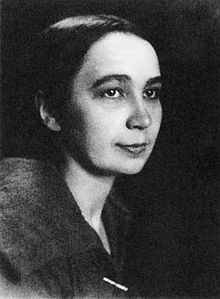Natalia Goncharova | |
|---|---|
| Наталья Гончарова | |
 Goncharova in 1910 | |
| Born | Natalia Sergeevna Goncharova 3 July 1881 Nagaevo, Tula Governorate, Russian Empire |
| Died | 17 October 1962 (aged 81) Paris, France |
| Resting place | Ivry Cemetery, Ivry-sur-Seine, France |
| Nationality | Russian French (from 1938) |
| Education | Moscow Institute of Painting, Sculpture and Architecture |
| Known for | Painting, costume design, writer, illustrator, set designer |
| Movement | Russian Futurism, Rayonism, Primitivism |
Natalia Sergeevna Goncharova (Russian: Ната́лья Серге́евна Гончаро́ва, IPA: [nɐˈtalʲjə sʲɪrˈɡʲe(j)ɪvnə ɡənʲtɕɪˈrovə]; 3 July 1881 – 17 October 1962) was a Russian avant-garde artist, painter, costume designer, writer, illustrator, and set designer. Goncharova's lifelong partner was fellow Russian avant-garde artist Mikhail Larionov. She was a founding member of both the Jack of Diamonds (1909–1911), Moscow's first radical independent exhibiting group, the more radical Donkey's Tail (1912–1913), and with Larionov invented Rayonism (1912–1914). She was also a member of the German-based art movement Der Blaue Reiter. Born in Russia, she moved to Paris in 1921 and lived there until her death.
Her painting vastly influenced the avant-garde in Russia. Her exhibitions held in Moscow and St Petersburg (1913 and 1914) were the first promoting a "new" artist by an independent gallery. When it came to the pre-revolutionary period in Russia, where decorative painting and icons were a secure profession, her modern approach to rendering icons was both transgressive and problematic. She was one of the leading figures in the avant-garde in Russia and carried this influence with her to Paris.[1][2]
- ^ Jane Ashton Sharp (2006). Russian Modernism between East and West: Natalia Goncharova and the Moscow Avant-garde. New York: Cambridge University Press. p. 14-15.
- ^ Sharp, Jane E. (2000). "Natalia Goncharova". In Bowlt, John E.; Drutt, Matthew (eds.). Amazons of the avant-garde: Alexandra Exter, Natalia Goncharova, Liubov Popova, Olga Rozanova, Varvara Stepanova, and Nadezhda Udaltsova. New York: Guggenheim Museum. p. 156. ISBN 0-8109-6924-6.